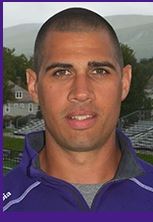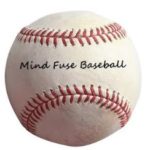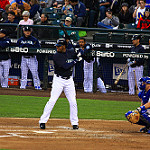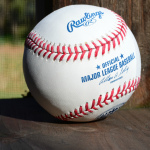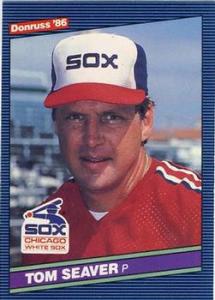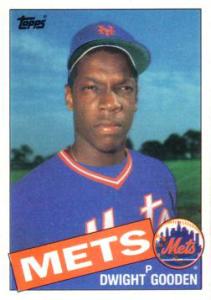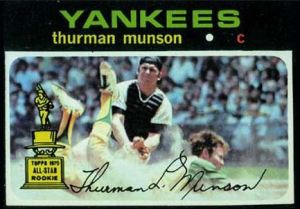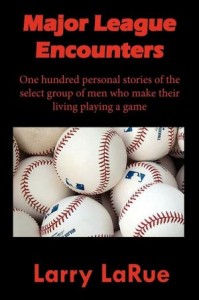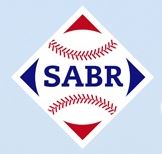As regular Baseball Roundtable readers know, Baseball Roundtable invites and encourages guest contributions to its “Why I Love Baseball” page. Today, BBRT is pleased to present a post from Jason Love, author of the book “Slices of Americana – a Road Trip Through American Baseball History“published this year by Sunbury Press.
Love is a lifelong Phillies fan who lives in New Jersey. Love combines his passion for baseball and history (he has history degree from West Chester University) to his approach to the National Pastime and the road trip genre of baseball writing. In addition to “Slices of Americana,” Love has authored “A Visit to New Jersey’s Minor League Ball Parks.” He also presents lectures on baseball history at local libraries and other community venues (more than 50 communities to date.) You can find him at TalkingBaseballWithJasonLove.
com and on Twitter @jason_love1. You’ll find a brief Baseball Roundtable review of Love’s latest book at the end of this post.
WHY I LOVE BASEBALL
By Jason Love
My first memories of baseball are not of going to my first professional game or watching the Phillies on television. Although I do have some vague memories of the Phillies winning the World Series over the Kansas City Royals in 1980. I remember watching the final game with my family and wondering why the Philadelphia Police Department brought German Shepherds onto the field prior to the final out. The police were anticipating the fans at Veterans Stadium storming the field. As a seven-year-old, I had a feeling that something special was happening. I can remember Tug McGraw leaping into the air after striking out Willie Wilson.
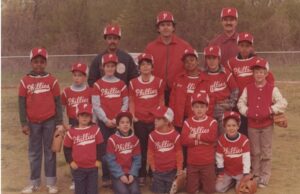 Playing Little League baseball is what I remember most about the game as a child. I have fond memories of my teammates, the snack bar, my first uniform and glove, and the game itself. Playing baseball in my youth laid the foundation for my love of America’s Pastime. I was never a great player (not even a good one), but I loved playing as a kid. In the early 1980s I had visions of being the next Pete Rose or Manny Trillo (we both played second base). In addition to Little League, I played Wiffle Ball with my buddies throughout the summer. I remember Saturday mornings spent watching This Week in Baseball narrated by the great Mel Allen and The Baseball Bunch with Johnny Bench. Collecting baseball cards was also a big part of my childhood. The 1985 Topps Dwight Gooden card was considered gold. Baseball was woven into the fabric of my childhood.
Playing Little League baseball is what I remember most about the game as a child. I have fond memories of my teammates, the snack bar, my first uniform and glove, and the game itself. Playing baseball in my youth laid the foundation for my love of America’s Pastime. I was never a great player (not even a good one), but I loved playing as a kid. In the early 1980s I had visions of being the next Pete Rose or Manny Trillo (we both played second base). In addition to Little League, I played Wiffle Ball with my buddies throughout the summer. I remember Saturday mornings spent watching This Week in Baseball narrated by the great Mel Allen and The Baseball Bunch with Johnny Bench. Collecting baseball cards was also a big part of my childhood. The 1985 Topps Dwight Gooden card was considered gold. Baseball was woven into the fabric of my childhood.
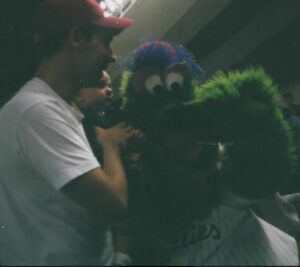 When my oldest daughter Delia was born in 1999, I started taking her to games at Veterans Stadium. One of my favorite photos is of me holding Delia up to meet the Phillie Phanatic in the 700-level of The Vet. She has a confused look on her face. Who is the green, fuzzy creature roaming about the stadium? When Sophia and Ian were born, I started taking them to games as well. We always enjoyed time spent at the ballpark. The game itself was just the backdrop. My kids had fun getting hot dogs, ice cream and cotton candy. And all of us still get a laugh out of watching the Phanatic. We always have fun and simply enjoy our time spent together at the ballpark.
When my oldest daughter Delia was born in 1999, I started taking her to games at Veterans Stadium. One of my favorite photos is of me holding Delia up to meet the Phillie Phanatic in the 700-level of The Vet. She has a confused look on her face. Who is the green, fuzzy creature roaming about the stadium? When Sophia and Ian were born, I started taking them to games as well. We always enjoyed time spent at the ballpark. The game itself was just the backdrop. My kids had fun getting hot dogs, ice cream and cotton candy. And all of us still get a laugh out of watching the Phanatic. We always have fun and simply enjoy our time spent together at the ballpark.
The main reason I love baseball is the way it connects different generations. Baseball connects people of all ages and of all different social and economic backgrounds. Sitting at the ballpark, you can strike up a conversation with the person next to you about a favorite player, team, moment, or whatever. It does not matter if the person in the seat next to you is a CEO, bus driver, or visiting from another city. I like going to the ballpark with a friend, having a beer or two, and enjoying the moment. I enjoy watching my son Ian play Little League, just as I did 30 years ago. Baseball, at all levels, provides an instant connection between people.
I also love the timelessness of the National Pastime. Baseball today is essentially the same as it was in the 1880s. Yes, there have been some rules changes and the stadiums are bigger and the scoreboards more elaborate, but the atmosphere, the camaraderie of fandom, the discussion and debate and even the sense of history remain the same.
Over the years, I have visited several minor league ballparks and I make sure to watch several games each season at Citizens Bank Park in Philadelphia. This past year, my children and I took a road trip to PNC Park to watch the Phillies play the Pirates in Pittsburgh.
Ultimately, the final score does not matter much to me. Of course, I hope the Phillies win; however, it is more about spending an afternoon watching some baseball with my family and creating wonderful memories.
For More Why I Love Baseball posts, click the link at the top of the Baseball Roundtable home page.
______________________________
_________
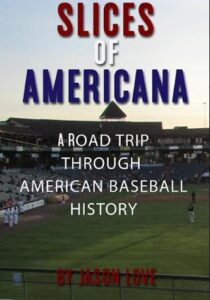 Baseball Roundtable looks at Jason Love’s “Slices of Americana – A Road Trip Through American Baseball History.”
Baseball Roundtable looks at Jason Love’s “Slices of Americana – A Road Trip Through American Baseball History.”
It’s clear author Jason Love has a passion for the national pastime, a love of history and the ability to tell a good story. Toss in a perspective shaped by personal/life challenges, a rancorous political climate and the impact of the surging Coronavirus epidemic (not to mention a penchant for The Waffle House) and you have a unique and entertaining entry into the baseball “road trip” genre.
In the book’s series of seven “essays,” Love shares the tales of 2019/2020 family road trips that taken him all the way from the Babe Ruth Hall of Fame and Museum and the National Baseball Hall of Fame in Cooperstown to Love’s own Little League field in New Jersey and the minor-league home of the Reading Fightin’ Phillies. He shares the emotions baseball brings to him – from the reverence of entering the Baseball Hall of Fame to the joy of a Father’s Day game of catch with his son on a professional diamond. And, he touches on baseball history and personal memories along the way – from Babe Ruth’s childhood, to Hall of Famer Judy Johnson’s stellar Negro League career to Ken Griffey, Jr.’s 500th home run … all the way to some of his personal favorite players like Manny Trillo and Steve Jeltz and even his own Little League career.
On the pages/posts of Baseball Roundtable, I often note that when researching a baseball topic “one thing always seems to lead to another.” That describes Love’s book – one thing baseball always seems to lead to another and Love ties these stories (big and small) together well. For example, the book appropriately comes to a close with Opening Day (July 23, 2020) and Love uses this chapter to consider the sense of hope that each Opening Day brings to fans. He also recognizes such “one thing leads to another” topics as the first official Opening Day (April 22, 1876 – Boston Red Stockings versus Philadelphia Athletics), Howard Taft’s first Presidential first pitch (1910), Walter Johnson’s 15-inning Opening Day (1926) shutout, Bob Feller’s 1940 Opening Day no-hitter and more.
All in all, a good read for the baseball fan – penned by an individual who clearly “loves” the game. (Pun intended.) Love’s book ($14.95) is available from Amazon.com and Sunbury Press.
BASEBALL ROUNDTABLE ON THE TOP 100 BASEBALL BLOG LIST
 Baseball Roundtable is on the Feedspot list of the Top 100 Baseball Blogs. To see the full list, click here.
Baseball Roundtable is on the Feedspot list of the Top 100 Baseball Blogs. To see the full list, click here.
I tweet baseball @DavidBBRT
Follow/Like Baseball Roundtable’s Facebook Page here. More baseball commentary; blog post notifications; PRIZES.
Member: Society for American Baseball Research (SABR); The Baseball Reliquary; The Negro Leagues Baseball Museum.
